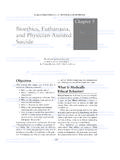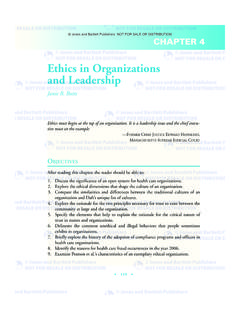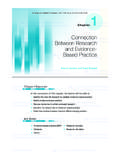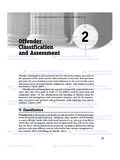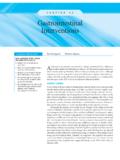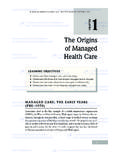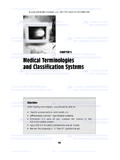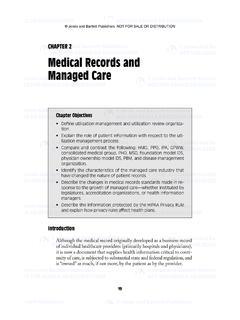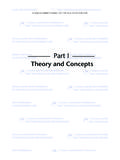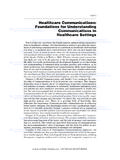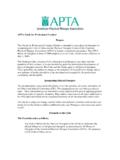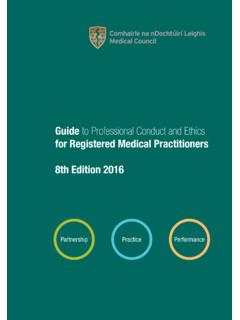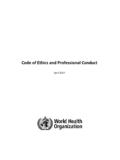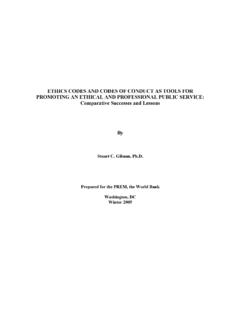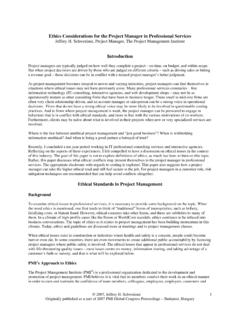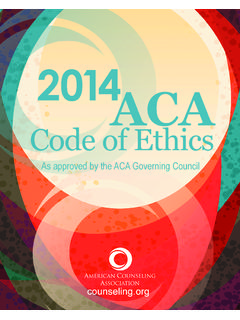Transcription of Ethics in Professional Nursing Practice
1 Ethics in Professional Nursing PracticeJanie B. ButtsCHAPTER 3 81 But nurses are still reaching out towards ideals which we trust may be realized in the full-ness of time. ISABELHAMPONROBB, 1900 OBJECTIVESA fter reading this chapter, the reader should be able to:1. Delineate key historical events or activities that led to the development of the ANACode of Ethics for Nurses with Interpretive Statements (2001) as it is known implications for Nursing Practice based on the language changes in the2001 ANA Code of Ethics for Nurses with Interpretive the significance of concepts that are interwoven in the 2001 ANA Code ofEthics for Nurses with Interpretive Statements to Nursing Practice (see also Appendix A).
2 And contrast the six professionalism and boundary concepts of nursingpractice in terms of the deontology and utilitarian frameworks. the eight concepts of the eHealth Code of Ethics as they relate to thefundamental principle of respect for Discuss the Internet Healthcare Coalition s tips for nurses to help patients andthemselves in evaluating the quality of health information on the Analyze potential human ethical violations that place the basic fundamental ethi-cal principles of autonomy, beneficence, and nonmaleficence at 9/25/07 4:40 PM Page 81 Jones and Bartlett Publishers.
3 NOT FOR SALE OR DISTRIBUTIONKEYTERMSE thical codesBasic dignityPersonal dignityGiving respectMaintaining confidentialityHaving moral courageCultureGiving culturally sensitive careASKP owerUsing powerBeing a good citizen of the worldTelehealthProfessional Codes of Ethics in NursingThe beginning of Professional Nursing can be traced to 19th-century England to theschool that was founded by Florence Nightingale, where profession-shaping ethicalprecepts and values were communicated (Kuhse & Singer, 2001). Nightingale sachievement was a landmark in Nursing even though graduates of her school per-formed below desired expectations in the early days.
4 For the first 30 to 40 years inNightingale s school, the prospective nurses were trained by male physicians becausethere were not enough educated nurses to teach Nursing . Because of the strong med-ical influence, early Nursing educators focused on technical training rather than on theart and science of Nursing , as Nightingale would have the end of the 19th century, modern Nursing had been established, and ethicsin Nursing was seriously being discussed. The presence of the Nightingale Pledge, firstdeveloped in 1893 and written under the chairmanship of Detroit Nursing schoolprincipal Lystra Gretter, helped establish Nursing as an art and a science (as cited inDossey, 2000).
5 The International Council of Nurses (ICN), which has been a pioneerin developing a code of Nursing Ethics , was established in 1899. By 1900, the firstbook on Nursing Ethics , Nursing Ethics : For Hospital and Private Use, had been writtenby the American Nursing leader Isabel Hampton , a primary value consideration in Nursing Ethics has been the determi-nation of the focus of nurses work. It is interesting to note that in Isabel HamptonRobb s Nursing Ethics book of 1900, the titles of the chapters were descriptive of thetimes, such as Chapter 4: The Probationer, Chapter 7: Uniform, Chapter 8: Night-Duty, and Chapter 12: The Care of the Patient (nurse-physician, nurse-nurse, nurse-public relationships).
6 Refer to Box for excerpts from Robb s book representingnursing s environment in the 1960s, the focus in the Nursing codes was on the physician, which is notsurprising, based on the fact that over the years most nurses have been women andmost doctors have been men. The focus on nurses obedience to physicians remained82 CHAPTER 3: Ethics IN Professional Nursing 9/25/07 4:40 PM Page 82 Jones and Bartlett Publishers. NOT FOR SALE OR DISTRIBUTIONat the forefront of Nursing responsibilities into the 1960s, and this assumption wasstill reflected in the ICN Code of Ethics for Nursesas late as 1965.
7 By 1973, however,the focus of the ICN code reflected a shift in Nursing responsibility from the physicianto the patient, where it remains to this codesare systematic guidelines for shaping ethical behavior that answerthe normative questions of what beliefs and values should be morally accepted. How-ever, it must be noted that no code can provide absolute or complete rules that are freeof conflict and ambiguity. Because codes are unable to provide exact directives formoral reasoning and action in all situations, some people have stated that virtue ethicsprovides a better approach to Ethics because the emphasis is on a person s characterrather than on rules, principles, and laws (Beauchamp & Childress, 2001).
8 Propo-nents of virtue Ethics consider that if a nurse s character is not virtuous, the nurse can-not be depended on to act in good or moral ways even with a Professional code as aguide. Professional codes, however, do serve a useful purpose in providing direction toPROFESSIONAL CODES OF Ethics IN Nursing : HIGHLIGHTS FROM THEFIELDE xcerpts from Nursing Ethics by Isabel Hampton Robb: The Physician-Nurse Rela-tionship in 1900 Unfortunately, here and there we find a nurse who through ignorance butfar more often from the gradual growth in her of self-conceit and an exagger-ated idea of her own importance may overstep the boundary limit.
9 [ital-icsadded for emphasis]. (pp. 249 250) Moreover, if in prescribing the procedures to be employed the physician goesinto minute details as to the way in which certain of them are to be carriedout, his wishes are to be law to the nurse. The question whether she agrees per-fectly with his recommendations, or believes that her own methods are better,has no bearing upon the case. Apart from the fact that she may be quitewrong in her opinions, her sole duty is to obey orders, and so long as she doesthis, she is not to be held responsible for untoward results[italics added foremphasis].
10 (p. 250)Quoted from Robb, I. H. (1916). The care of the patient: Relation of the nurse to thephysician. Nursing Ethics : For hospital and private use. Cleveland, OH: E. C. Koeckert.[Original publication 1900] 9/25/07 4:40 PM Page 83 Jones and Bartlett Publishers. NOT FOR SALE OR DISTRIBUTION health care professionals although, ultimately, one must remember that codes do noteliminate moral dilemmas and are of no use without professionals who are motivatedto act morally. For the code to have more meaning, Benner contended when speakingof the nurse s role in working for social justice, each of us and each Nursing organiza-tion must breathe life into the code by taking individual and collective action (Fowler & Benner, 2001, p.)
